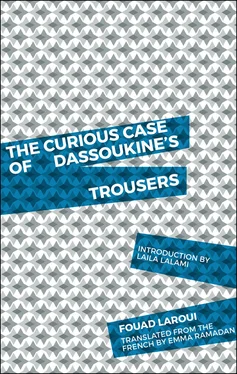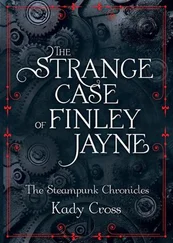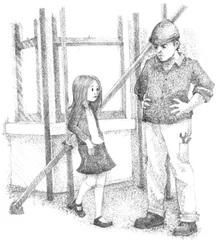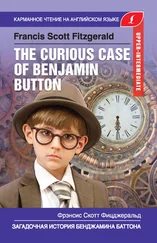“Not even.”
“Well, my dear friend, we can already predict the worst catastrophes are in store for you. One must always read everything when it’s an administrative affair. Down to the last word, every comma. And even between the lines.”
“Perhaps. But I didn’t pay any attention to the information in the document because I believed (naively) that I already knew the details.”
A pause.
“After all, I know who I am, right?”
This was said in a defiant tone, the strands of his hair disheveled, his look somber. I, prudently:
“We say that, and then one day…”
He cut me off, vehemently:
“But no! Big mistake! We don’t know who we are, monsieur! We know nothing, monsieur, no matter what Aristotle and all of philosophy have to say about it! When I received my identity card, I saw with stupefaction that after ‘place of birth’ came the response: ‘Khzazna,’ even though I believed I remembered — vaguely — having been born in Rabat.”
“You remember your place of birth? That’s a bit precocious.”
He shrugged his shoulders.
“I mean to say that I’ve always more or less known that I was born in Rabat. Where did this strange Khzazna come from? It wasn’t a series of typing errors, the letters in ‘Rabat’ and in ‘Khzazna’ aren’t close on the keyboard. I verified — even a monkey typist, even a doddery drunkard, could not end up with ‘Khzazna’ while trying to type ‘Rabat.’ Or else, he would have to be flailing around in every which way…”
He leaned toward me, finger raised.
“I calculated the probability of getting ‘Khzazna’ while trying to type ‘Rabat’: one chance in one hundred thousand billion. On the human level, monsieur, it’s an impossibility! ”
“Excellently said.”
“All this was bizarre. At that moment, I couldn’t do anything, for I was preoccupied with my departure for France, which constitutes, as you know, a veritable obstacle course, with its pre-registrations, its registrations, its thousand certificates…But I remained intrigued by this story.”
“Why not just forget about it?”
“Forget about it? It quickly became an obsession! After resolving a thousand problems related to settling in France, I reached a calmer period of my life; and, to be honest, happier. We are, after all, in one of the most beautiful cities in the world?”
“Mmm.”
“One of the most interesting?”
“Hrmblmmmn.”
“But all my friends at the Cité Internationale where I had set down my luggage, all my friends were born in prestigious places, such as Fes or Rabat or Marrakech, or at least interesting places, such as Azrou or Azemmour. But Khzazna? Quès aco? I kept a low profile, buckling under the weight of my shameful secret. And if they were to ask me where I had seen the light of day? Would I be able to lie?”
A waiter materialized above our table, haughty in black and white, and enjoined us to order something (“or else disappear,” his scowl seemed to say). We ordered two coffees and he left, full of disdain. The young man resumed his story.
“Sometimes it was the opposite — I was caught up in a flash of exaltation and saw myself as a duke or at least a marquis, lord of a land perhaps inundated with history, and I was ‘of Khzazna’ as others are ‘of La Rochefoucauld.’ But the exaltation faded fast and I was rotting away once more in the agony of not knowing who I was, having been born nowhere. I needed to be sure! After research worthy of the best explorers, conducted at the Centre Pompidou and at the Bibliothèque Nationale on the rue Richelieu, after exhausting numerous road maps, I succeeded in locating this place where I had been born, at least in the eyes of the law. The pre-war Guide Bleu, unearthed at a secondhand bookstore, was adamant: Khzazna existed indeed!”
“That must have reassured you.”
“It was a spot on a map!”
“That’s better than nothing.”
“Mmmmyeah. A Guide Bleu dating from the Protectorate, suffice to say from prehistoric times…So, a few months ago, during summer vacation, back in Morocco, I wanted to be sure. Without saying anything to anybody, I took the bus to Rabat and I went to see. I saw. In fact, Khzazna is not the name of any city, nor any village, nor any hamlet.”
“A ruin, then? A poet’s dream? At least a well?”
“No. It’s a beautiful land fifty miles east of Rabat, a rather pleasant countryside where time stopped long ago — in the age of the Guide Bleu perhaps. It’s swarming with cows, sheep, hens, and rabbits.”
“So far, nothing extraordinary.”
“Nothing extraordinary, certainly; but imagine my surprise when I learned, after approaching a local gnome and asking him a few questions, that there wasn’t even a hint of a hospital nor of a maternity ward in this place. There’s only a free clinic in the small neighboring village, constructed two years ago. I’m a little bit older than that, after all.”
He slouched in his chair, brow furrowed.
“The question you must be asking yourself now, that I asked myself a long time before you, is the following: where was I born, exactly? Between two trees? On a hill? There, next to the stream?”
“In a barn, like Jesus?”
“There wasn’t a single barn in the vicinity. (Do you mind? It’s my story.) When I returned to the house, in the grips of a great anxiety…”
“…of identity…”
“…I rushed to the kitchen and demanded that my mother enlighten me. She was kneading I don’t know what in the half-light. A good minute passed before anything happened. Then she replied, seemingly unbothered, that I was born in the maternity ward of Rabat, like everyone else…”
“…but…”
“…but that my maternal grandfather had beseeched my parents to write the word “Khzazna” in the family records, in the appropriate box.”
“The grandfather’s always to blame.”
“Indeed, but why? Why? You’ll never guess in a million years.”
“I give up immediately.”
The waiter appeared and placed on our table, in a brusque gesture, two cups of coffee (tintinnabulating as they knocked against each other); then he left, full of arrogance. The young man leaned toward me once again, as if he were about to reveal the third secret of Fatima.
“All because, at the time, he would often run as a candidate in the local elections in the district of Khzazna! Elections he sometimes won, but with the tiniest lead: one vote, one alone, could make all the difference.”
Now I really got into the discussion, my voice vibrating with incredulity (80 %) and indignation (20 %):
“You expect me to believe that in this land where there are only, according to you, cows, sheep, hens, and rabbits, they vote, they elect representatives of the people in real assemblies? There are congressmen? Councillors? County magistrates, perhaps?”
He drank a small sip of coffee then struck his fist against the table (an abundance of! followed).
“Exactly, monsieur! There is all that and perhaps even more! Laugh as much as you like!”
“But…why?”
“The first governments after Independence wanted it that way, probably in order to balance the weight of Rabat, that nest of leftists who voted like one single man for Abdallah Ibrahim and his friends. As I just told you, there were so few voters in Khzazna that one sole vote could make the difference. For my grandfather, I then represented not his grandson newly landed on earth ( you-you-you! ululated the women), but a potential elector who would vote for him when I came of age, twenty-one years later .”
I was flabbergasted.
“Twenty-one years later?”
“Indeed!”
Читать дальше












